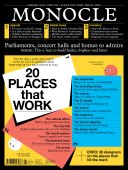
Issue 160
Monocle’s February issue is all about celebrating places that work, whether that’s a parliament, home or metro carriage. From a floating office to a school teaching children the rules of the road, we profile the locations that look good and work well for those who use them. Plus: Charleston’s hospitality boom and why you should learn Russian.
In This Issue
Oops! No content was found.
Looks like we no longer have content for the page you're on. Perhaps try a search?
Return Home

